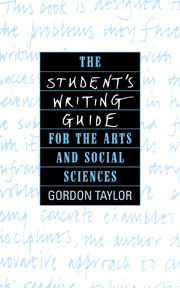Book contents
- Frontmatter
- Contents
- Preface
- Sources of extracts used in the text
- 1 Introduction
- Part I Reflection and Research
- Part II The Dynamics of an Essay
- Part III Language
- 7 You, your language and your material
- 8 Analytical language I: sentences
- 9 Analytical language 2: rhetorical strategies
- 10 Cohesion and texture
- 11 Conventions of academic writing
- Appendices
- Index
11 - Conventions of academic writing
Published online by Cambridge University Press: 29 January 2010
- Frontmatter
- Contents
- Preface
- Sources of extracts used in the text
- 1 Introduction
- Part I Reflection and Research
- Part II The Dynamics of an Essay
- Part III Language
- 7 You, your language and your material
- 8 Analytical language I: sentences
- 9 Analytical language 2: rhetorical strategies
- 10 Cohesion and texture
- 11 Conventions of academic writing
- Appendices
- Index
Summary
Academic culture
To be a student in a college or a university is not only to be a learner. It is also to be a member of a community and a culture with customs, myths and rituals which differentiate it in significant ways from other communities and cultures to which you might belong — sporting clubs, churches, political parties, and so on. To be in university or college is to submit to a sometimes bewildering array of customs and expectations that can take many, many months to feel at home with. To study history or anthropology is to enter the department of history or the department of anthropology, where you are quite likely to be regarded as having begun a novitiate to the vocation of historian or anthropologist. You must therefore learn the customs and rituals of the vocation.
Most departments initiate you by providing a manual or outline of studies for the year. In this there will often be a section called ‘Essay writing’ or, more candidly, ‘Rules for the presentation of written work’. These are the rules you have to learn, notwithstanding the initially confusing fact that the requirements of one department might well conflict with those of another.
- Type
- Chapter
- Information
- The Student's Writing Guide for the Arts and Social Sciences , pp. 218 - 226Publisher: Cambridge University PressPrint publication year: 1989



